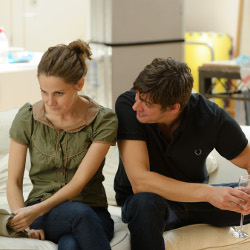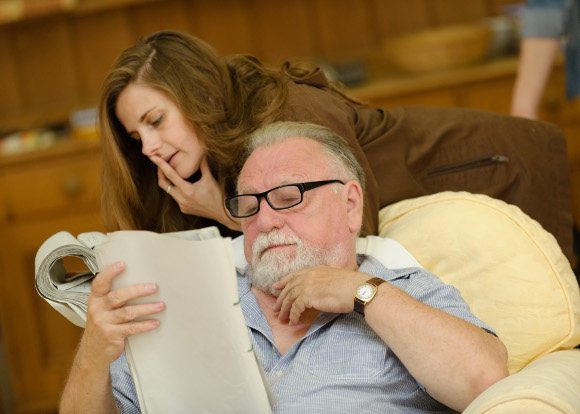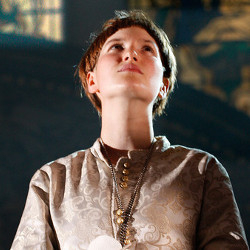Brief Encounter with… Louise Brealey

© Simon Kane
Can you tell us a bit about The Herd?
It's about a family on a family occasion, with all the attendant joy and agonies. It is a wonderful piece of writing: funny, tender, cruel and brutally honest. The sort of play that gets better and better as you test it in the rehearsal room.
Have you ever done anything like it before?
Surprisingly not, although Rory [Kinnear]’s writing feels like classic writing. I haven’t done a family drama in this way; it feels very fresh and very classic at the same time. The last thing I did I was naked as Helen of Troy, so this feels definitely like a departure!
What’s interesting to explore is just the relationships. There are six of us in there, so that’s five different relationships that you have to peg down and make real and enjoy and explore, so that’s great. Because Rory’s an actor, he’s written everyone with a journey.
Did you enjoy the rehearsal process?
Howard Davies is so clear about what he wants that it makes the goals you set yourself very clear. I absolutely loved it. There was a lot of last-minute stress with Pope Joan, my play, in the first fortnight so coming into rehearsals was like getting into a cool bath on a disgustingly sweaty day.
Is there a central message to be taken from The Herd?
I don't know about a message, but for me it's about love. About how hard love can be – about the cracks in families that can become chasms and canyons – and also about its redemptive power.
Rory Kinnear has said the Bush is the perfect setting for the play. What about it helps?
The size of the venue is helpful, and the fact that we’re doing it in traverse with people on both sides: they’re flies on our wall really rather than it being proscenium arch, I think that really suits the play. You often get a sense of eavesdropping when you’re watching other people’s scenes, and I think that will feel great there.
It’s lovely to be going back to the Bush now that they’re nearly two years old. It feels more established, but they still have a sense that nobody’s tired of being there. It’s a place that’s still exploring what it wants to be, in a good way.

© Simon Kane
You have just written your first play, Pope Joan. Did you enjoy it?
I'm not sure enjoy would be the word I'd choose. At times it wasn't like solving a puzzle, but inventing one. It was emotionally hard because I had to slay a lot of demons, like your own fears of failure and your own fears of not being able to write anything. And it was very quick. Just four months from start to finish for a thriller with a cast of fifty set in ninth century Rome about a transvestite Pope. I have playwright friends who just blanched at the writing time for a play that ambitious, so that made it much tougher I think. It's got an abortion, an exorcism, theological debate, political intrigue, a love story and the songs of Antony and The Johnsons. I could've done with four months' research!
What’s nice is sharing the responsibility for it, and that became very obvious to me once I started going into the church to see them teching and stuff. It’s entirely solitary and then it becomes something that you couldn’t possibly achieve by yourself, it’s a wonderful collaboration and everybody invests themselves into it and it becomes something that we all make, and that bit of it I really like. It became something that was ours rather than mine and that was both a relief and a joy.
Has writing a play changed your attitudes at all?
Having done it I just have huge admiration for anyone who tries. There’s a world of difference between wanting to do it and sitting there on press night with your fist in your mouth thinking ‘Holy shit, is it going to be alright?’. I’ve definitely got way more respect for writers. It’s great to walk a mile in the other woman’s shoes.

© Simon Annand
Does your experience of writing a play change the way you approach acting?
I don’t think it’s changed the way I approach it, because you’ve got a completely different hat on, but I do think it worked the other way. I think acting informed the sort of play I wrote, I wanted to write parts that people would get excited about playing, parts I’d want to play.
Would you encourage other actors to go into writing?
I think I’d encourage anyone who wants to write, to write, but there isn’t a chance on earth I would have finished that if I didn’t have someone saying ‘have that draft by Monday'. I couldn’t have motivated myself, I realised that as I did it, that I needed that framework. I needed people saying you will give it in otherwise I just wouldn’t have done it. I do think it’s important to try.
Do you want to do more writing? Any idea what?
No idea, because up until about two weeks ago the idea of writing anything ever again was anathema to me so I haven’t really had a chance to think about what it might be. I think possibly something contemporary so that I can use my writing voice in a slightly different way, so I think that would be a good thing to do.
You are a noted feminist, and have described this as an "exciting time for feminism" – do you think there should be more plays exploring feminist issues?
I'd just like to see more parts for women and more women writers and directors. The proportion of male to female in the theatre as a whole is still 2:1 which I think is hopeless given we are supposed to represent some sort of cultural vanguard. We especially need more parts for women over thirty. It's a joke that change is so slow and I'm really bored of industry complacency about it. Meek acceptance and gentle griping are not going to change anything.
We need to challenge the idea that the only universal story is one with a male protagonist. And the idea that men won't watch women unless they're in a camisole. It's not the 1970s. It was annoying with Joan because I wanted to redress the balance, but I could only have two women (young and older Joan) and tens of men because the play is exclusively set in a man's world. But I tried to give both Joans a good bite of the pie. At one point I was thinking of inverting it, having them all as women and her as a man, but I thought ultimately it just felt like a perversion rather than an inversion and I wondered what that would bring.
What’s next?
I’m doing The Herd until 26 October and then unless something irresistible comes up, I’m going on holiday! It’s been a very long time, and at one point I’d had 9 weeks without a day or evening off. I intend to spaff my Pope Joan cheque on an extended trip to the seaside.
The Herd runs at the Bush Theatre until 26 October










